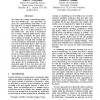Free Online Productivity Tools
i2Speak
i2Symbol
i2OCR
iTex2Img
iWeb2Print
iWeb2Shot
i2Type
iPdf2Split
iPdf2Merge
i2Bopomofo
i2Arabic
i2Style
i2Image
i2PDF
iLatex2Rtf
Sci2ools
148
click to vote
IJCAI
1997
1997
Compiling Reasoning with and about Preferences into Default Logic
We address the problem of introducing preferences into default logic. Two approaches are given, one a generalisation of the other. In the first approach, an ordered default theory consists of a set of default rules, a set of world knowledge, and a set of fixed preferences on the default rules. This theory is transformed into a second, standard default theory, where, via the naming of defaults, the given preference ordering on defaults is respected. In the second approach, we begin with a default theory where preference information is specified as part of an overall default theory. Here one may specify preferences that hold by default, or give preferences among preferences. Again, such a theory is translated into a standard default theory. The approach differs from previous work in that we obtain standard default theories, and do not rely on prioritised versions, as do other approaches. In practical terms this means we can immediately use existing default logic theorem provers for an i...
Related Content
| Added | 01 Nov 2010 |
| Updated | 01 Nov 2010 |
| Type | Conference |
| Year | 1997 |
| Where | IJCAI |
| Authors | James P. Delgrande, Torsten Schaub |
Comments (0)

